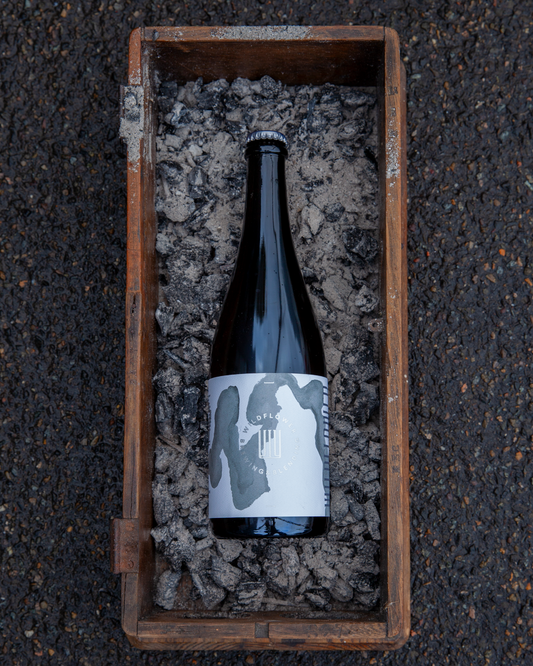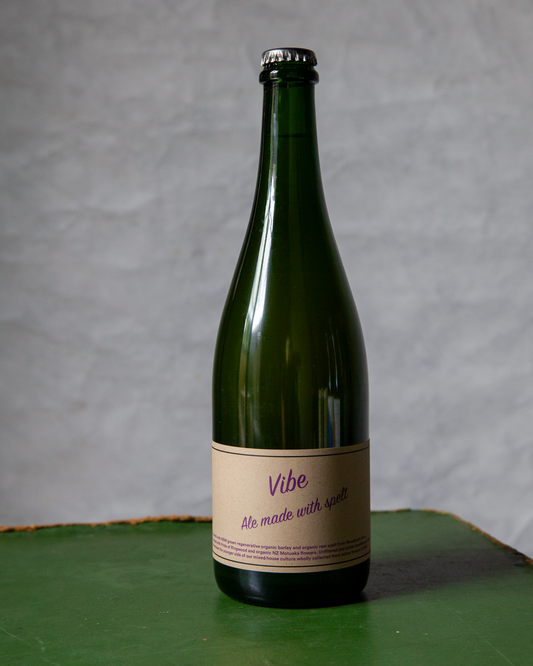We are very excited to announce that Wildflower St Thomas 2020 will be available online and for take-away/collection from 12pm (Sydney time) on Friday 7 August 2020.
St Thomas is an Australian Wild Ale refermented with cherries. While the beer is named for Chris and his wife's first son, the Saint Thomas Aquinas was an immensely influential 13th century philosopher and theologian. In 2020, it was made from amber mixed fermentation, barrel aged beer and 800kg of tree ripened, whole fresh Morello sour cherries from Thornbrook Orchard in Orange, NSW.
This year's edition of our annual cherry beer sees a synthesis of processes from 2018 and 2019 whereby the fruit was partially destemmed as well as allowed to carbonic macerate before being blended with beer. On the first note, we hand destemmed over 200kg of cherries to make St Thomas 2018 and it took us over three days to complete. In 2019, we had worked closely with Paula and her team at the orchard to organise and plan logistics as to how we could pick the fruit without the stems as they come off the tree. However, due to unseasonal hail in December in Orange that year, much of the fruit was dented and damaged which meant it needed to be picked faster and doing so without stems wasn't an option. Thomas 2019 utilised this stemmed fruit as we were also working with roughly 1 tonne of cherries because we committed to purchasing all the damaged fruit from Thornbrook. The resulting beer had a noticeable digestive, Fernet/minty flavour, which we enjoyed but did detract from the sweetness and flavour of the fruit. In 2020 (well the end of 2019 really) we were all set again to pick a portion of the cherries without stems but once again nature had a different idea. The cherries for St Thomas 2020 were picked on 22 December 2019, during the bushfires in the Blue Mountains. Not sure if you recall but the roads were being closely monitored and without warning shut to through traffic. As the Gosper's Mountain megablaze reached Blackheath, Paula and I became anxious that the Great Western Highway would be cut off and we wouldn't be able to collect the cherries in a reasonable amount of time. So, Paula made the decision to pick the cherries with stems, as is normal for them, in order for them to have a better chance of not rotting once they are off the tree. Removing the stem exposes a small lpart of the berry and risks ripping the skin which is why there was a logistics issue with collecting them as soon as they were picked.
So on 23 December, I made a quick one-day turnaround trip to Orange to collect the fruit. Through a lot of smoke and right through roadside back-burning operations in Blackheath, I was lucky to make it there and back in one go.

So the fruit made it to Sydney late that night, but I had a whole other issue on my hands of destemming ~400kg of cherries on Christmas eve. On the drive home, I rang my wife Bernadette and asked her if she could assemble an army of mates who would possibly be willing to give up some of their family time during the holidays and spend it instead helping us remove stems. I woke up super early on the 24th to get all the tanks and fruit ready/setup and by 8am people started arriving. For the next 6 hours, we had help from so many people across my life who pulled off a little Christmas miracle and hand destemmed, one by one around 400kg of cherries before my self imposed hard cutoff time of 2pm so we could all get home and enjoy the more important things. I have a few bottles of beer and sincere gratitude to everyone who came that day including Dennis D, Jess W, Tom E, Adrian P, Macca, Lucy M, Dom H, Liam H, Dom R, Claire E, Ell T, Bridge C, Nick S, Blake W, Meghan H and Boots (who put in a ton of hours over those two days).


The destemmed portion ~400kg was blended with a roughly equal weight of cherries with their stems intact in a 1500 litre variable capacity stainless steel vessel, which was promptly sealed and purged fully with carbon dioxide gas to eliminate oxidation. It was now nearing 5pm on Christmas Eve and I needed to get home to share those moments with my family. So, another harvest-time decision/trial was born where by we left the fruit for three days macerating under CO2 conditions before blending in beer. Those familiar with our process will recognise this technique from our wine grape beers and is has been something I have been keen to apply to other fruits. Out of need (and with a good dose of fear), I walked away from the fruit over Christmas and Boxing Day. When I returned on the 27th, we racked in barrel aged Amber and a small portion of fresh Amber to start fermentation.

The beer and fruit macerated and fermented with one another for 4 months before we did anything with it. An extra month from 2018 and 2019 harvests, Covid-19 shutdowns as well as a lingering grape harvest meant we were not only short on time to start blending Thomas but we also decided this year to decouple the 'St' beers release dates with the month of the corresponding child's birthday month. While that was a meaningful part of the release and something the kids could look forward to for their birthday, we wanted to start pushing macerations and bottle conditioning times longer and making these beers on a timeline was adding undue stress.
As normal for us, the initial refermentation was heavy, as in the ratio of beer to fruit disproportionately skewed to a very high fruit rate. We choose to macerate with an amount of fruit (say 800 kg for this beer) that will correspond to a set fruit rate of the final total volume of the blend. This way we can go into harvest with an idea in mind of the grams per litre we think will work from this year's fruit. However, depending on the harvest we can blend up or down on that rate in order to express the fruit in the way we like. The heavy 'wash' we have started to call them was racked off the fruit and more barrel aged Amber was racked onto the fruit for a second maceration for a number of weeks. The final fruit rate in St Thomas 2020 was approximately 325 grams of cherries per litre of beer. This was done one more time before we reached our desired flavour profile in the blend and ready for bottling on 20 May 2020.
In the end we blended 10 barrels of aged Amber to make St Thomas 2020, 1715 (9 month old Amber), 1716 (9 month old Amber), 1801 (17 month old Amber), 1831 (23 month old Amber), 1755 (11 month old Amber), 1733 (19 month old Amber), 1727 (3 month old Amber), 1704 (18 month old Amber), 1775 (23 month old Amber) and 1812 (23 month old Amber).
At release, St Thomas 2020 opens with aromas of rich cherry liqueur, bright after dinner mint and soft chocolate notes. Palate is on point. Loaded with bright sweet cherry fruit flavours across it, the Amber base beer gives profound complexity with dark chocolate, sweet spice, more red (currant) fruits and nuttiness. The harmony is wonderful, creating a simultaneously clean cherry forward beer while also a deeply complex and evolving drink.
The base beer is brewed entirely with New South Wales cereals: Single Origin (S.O.) Riverina NSW grown Schooner Munich malt, Binya NSW grown S.O. LaTrobe Vienna malt and Riverina NSW grown chocolate malt from Voyager Craft Malt. It is made with filtered Sydney water and Saaz (CZ) hops. Finally, it was fermented with our house culture: brewers yeast, foraged wild yeast and naturally occurring souring bacteria native to New South Wales. It was bottled on 20 May 2020 and naturally conditioned through refermentation for 11 weeks. At bottling it was 6.7% ABV, 18 IBU and 2.5°P (FG = 1.010 SG).
There are 3,200 x 375ml bottles and 18 x 1.5 litre magnums of St Thomas 2020 which will be split between our online shop, cellar door and wholesale accounts across Australia.
Like all our beers, St Thomas 2020 is best enjoyed when decanted off a settled natural yeast sediment at cellar temperatures (10-12°C).
We hope you enjoy this year's edition of one of our favourite beers to make and share.



